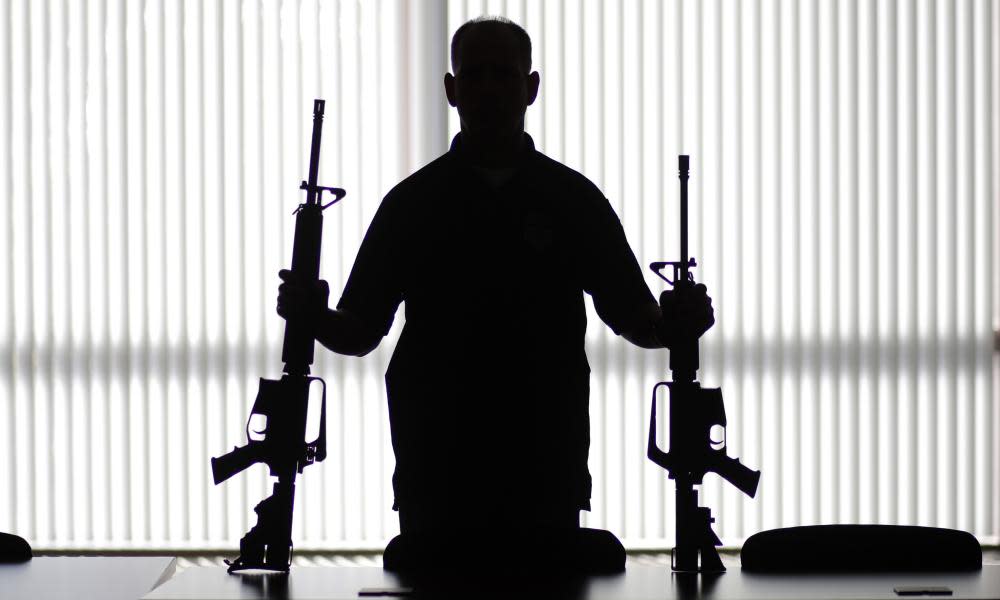US implements new rule to close loophole on untraceable ‘ghost guns’

A new Biden administration rule that puts kits used to build ghost guns in the same legal category as traditional firearms went into effect on Wednesday.
The new rule was announced by the White House in early April and requires companies that sell unassembled firearm kits to add serial numbers to their parts and conduct a background check on prospective buyers. It also requires federally licensed gun dealers to keep records on ghost gun kit sales until they go out of business.
Ghost guns, which are weapons built from firearm parts sold unassembled, were once a niche hobby among gun enthusiasts. But since the mid-2010s they have been increasingly found at the scenes of mass shootings, neighborhood homicides and in large busts of makeshift gun factories.
Because the kits were shipped in several pieces, and previously fell out of the bounds of what the US Bureau of Alcohol, Tobacco and Firearms (ATF) classifies as a legal firearm, manufacturers were not required to serialize frames and receivers – the main component of a firearm.
The loophole led to widespread proliferation, first on the west coast and then throughout the US, of untraceable guns that are easy for people who would be banned from having guns because of their legal record or history of domestic violence to get officials, attorneys and violence prevention workers say.
“[Ghost guns] are perfect for gun traffickers to put in the illegal market because they are more readily available at lower prices,” said David Pucino, deputy chief legal counsel for Giffords law center to prevent gun violence. The group has sued ghost gun manufacturers and joined suits filed by state and county prosecutors. “The only people who will be affected by the rule are those who want to traffic them and can’t walk into a gun shop and get one because of their record.”
The new rule is going into effect despite efforts to stop the ATF from enforcing it until all legal challenges have been resolved. In one of lawsuits, filed by Division 80, a company that sells the primary component of do-it-yourself gun kits, argued that classifying their products as firearms would put them out of business, court records show.
Another injunction request, originally filed by a gun owner, firearm dealer and gun rights advocacy group in North Dakota’s federal district court, now includes 17 states including Arkansas, Wyoming and Louisiana. They too argued that this rule will cause irreparable damage to the industry and will stop “law-abiding” gun owners from being able to build their own guns.
Pucino says these arguments signal that, “a large part of their customer base are those who can’t walk into a gun shop and buy a firearm or want them to be untraceable”.
Before the federal intervention, officials and prosecutors had sought to stop the flow of ghost guns into communities through bans in states like California, Connecticut and Delaware and lawsuits that accuse firearm kit dealers of using illegal and deceptive advertising practices.
The rule’s implementation is one of several steps the Biden administration has taken to counter the many forms that gun violence takes in the US. Early in the pandemic the White House implored states to use American Rescue Plan monies to fund community-based gun violence prevention and youth development programs. And in June, Biden signed the bipartisan Safer Communities Act, which would enhance background checks for prospective gun buyers under 21, and allocates $1bn in funding for local groups that work with those most at risk of shooting someone or being shot themselves and for statewide efforts to keep firearms away from people with a history of abuse.
Now that the rule is in place, gun kit manufacturers will have to re-submit products that were once deemed not to be firearms by the ATF’s firearm and ammunition technology division, which analyzes gun-related products. If retailers fail to get re-classified by the divisions and continue to sell kits without a background check and serial numbers they face being charged with federal gun trafficking offenses.
“The feds are not going to break doors down come Thursday. The lawsuits happen if push comes to shove if the industry responds in an egregious manner,” Pucino said. “This rule doesn’t mean the gun violence problem goes away but this is going to be a meaningful contribution if it’s implemented properly.”

 Yahoo News
Yahoo News 
